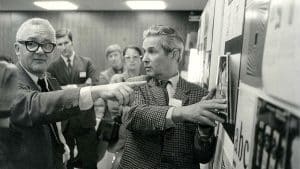What Do Graphic Designers Do On A Daily Basis?

Creative business tips to kickstart your career as an artist, designer, or content creator.
Surgery. Crab fishing. Putting out fires. Those are just a few of the things graphic designers don’t do (that last one is debatable).
Graphic design plays such an integral role in such a wide variety of industries that it’s actually easier to list the things graphic designers don’t do than to list the things they do. But we’ll try to give you the basics and help answer that burning question: exactly what do graphic designers do during their daily jobs?
What Do Graphic Designers Do?
Graphic designers often engage in a variety of creative and technical tasks on a daily basis. This includes brainstorming and sketching out new concepts, creating or editing images and layouts using specialized software, and conducting research into current design trends or materials for specific projects.
The design work is often a collaborative effort, involving discussions and meetings with clients, team members, and other stakeholders to ensure the final product meets the desired requirements and objectives.
The Role of Graphic Designers in Sales
It should come as no surprise that images and words are powerful tools for selling things and graphic designers know how to do this well. Graphic designers understand how to capture attention, control the viewer’s eyes, and leverage psychology in order to craft compelling emotional appeals and designs.
When you know how your customer thinks and what motivates them, it’s not too difficult to tap into their subconscious and start pulling some strings. By appealing to the viewer’s fears and desires, graphic designers can generate interest in products, services, branding voices, and so much more.
When you think of sales, you might think of a smooth talker willing to tell you whatever you want to hear to close a deal, but you can be surprisingly persuasive with just visual design alone. Eye-catching visuals, paired with some clever copy, will outsell even the best salesman a million to one.
So how do graphic designers accomplish this? The answer is…
Graphics Designers Tell Stories
Graphic designers use colors, type, and imagery not only to explain what a product or service does, but to build an atmosphere around it so customers also know who it’s for. The combination of these elements allows graphic designers to communicate feelings and ideas in ways that words or images simply can’t convey by themselves.
This is essentially what branding boils down to. The way we as consumers differentiate between the available options to choose the best solution for us depends on the story that a brand is telling and whether or not it aligns with our own.
Whether we view ourselves as no-frills, cost-conscious pragmatists or aficionados for whom only the best will do, graphic design is a tool brands use to signal those values and more to capture the right parts of the market that share those same values.
Sales and marketing tend to get a bad rap, and I’m sure all this talk of psychology is coming off a bit manipulative, but in reality, at the heart of all graphic design is service.
Graphic Designers Help People
What I mean is that graphic designers help people find what they’re looking for. In some cases, that may be helping someone find a product that solves a problem they’re having. In other cases, like signage, it’s more literal.
But generally, the main job of a graphic designer is to communicate a message. To do that well, over time, graphic designers have found shorthand ways and established conventions for the organization of information to help people more quickly and easily find what they’re looking for.
Graphic designers take on the difficult task of collecting complex information and distilling it into its simplest form to make it more digestible. An example in print would be the use of page numbers, headlines, and a table of contents to help readers navigate. In marketing, that might be something less obvious, like a specific combination of colors, imagery, and typography a brand can use to signal to potential customers, “Hey, you might be one of us.”
Project Management Within Graphic Design
In addition to all these creative and inspiring aspects, graphic designers also manage the logistical side of projects. This involves keeping track of multiple projects, timelines, and deadlines, as well as preparing and presenting design concepts to clients or team members.
Another part of the daily life of any graphic designer involves handling administrative tasks such as responding to emails, organizing files, and performing quality control checks to ensure that all design aspects meet a client’s specified standards before they are finalized and submitted.
Skill Development for Graphic Designers
Skill development and portfolio management are other crucial aspects of a graphic designer’s daily routine. Continual learning is essential in this ever-evolving field, whether it’s mastering new design software or staying updated on industry trends.
Additionally, updating your portfolio regularly with new work not only showcases your most recent projects but also highlights your ever evolving skill set as well. This is especially important for freelancers and those looking to advance in their careers as designers.
The End-Goal of Graphic Design is to Communicate
In summary, the field of graphic design is much more than just creating appealing visuals. It’s a discipline that intersects with psychology, storytelling, and business strategy to communicate messages effectively and drive results. This is what graphic designers do day in and day out.
Whether you’re an aspiring designer or someone looking to understand the value of design in your business, it’s never too late to delve into this exciting field and event make a career change to become a designer yourself.
To take your skills to the next level, consider enrolling in an online graphic design degree program offered at Sessions College. Our courses are designed to equip you with the latest industry knowledge and practical skills.

Sessions Staff is a restless soul who loves to share relevant news and design industry information with current and prospective students. Read more articles by Sessions Staff.
ENROLL IN AN ONLINE PROGRAM AT SESSIONS COLLEGE:

























